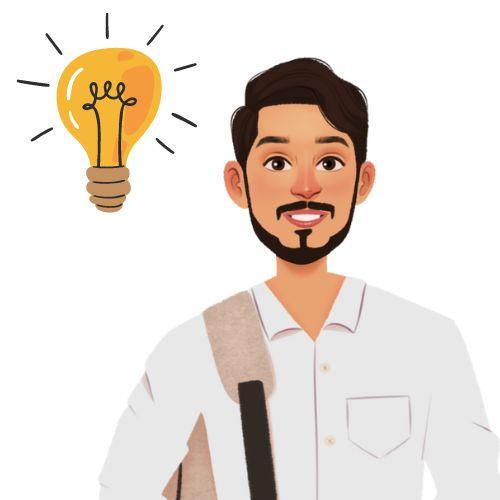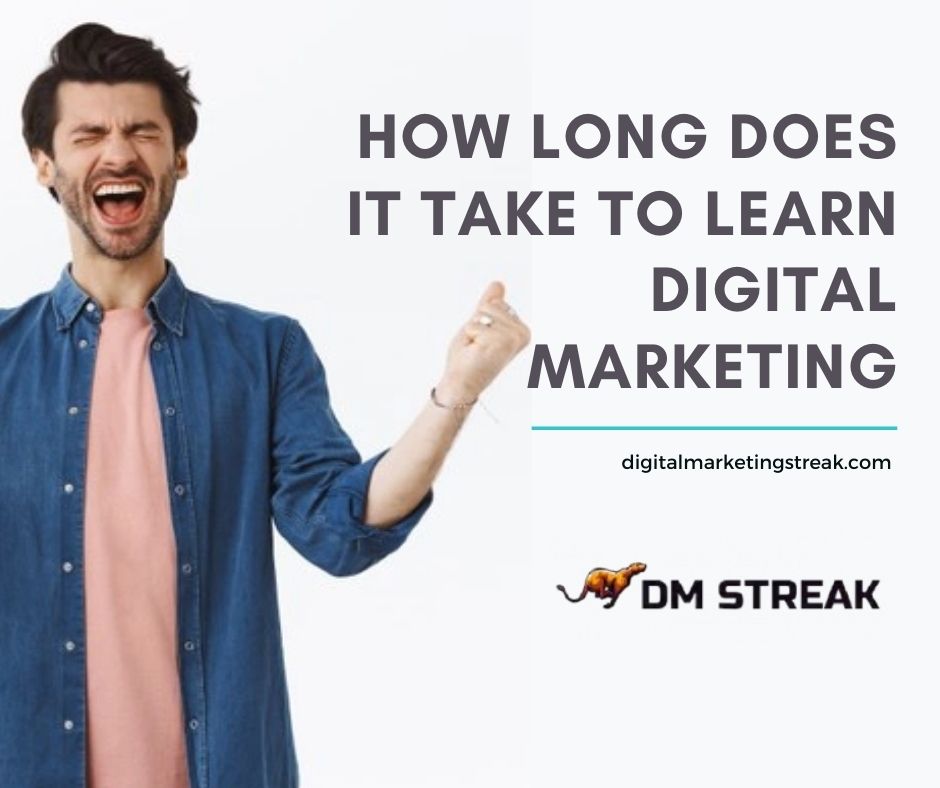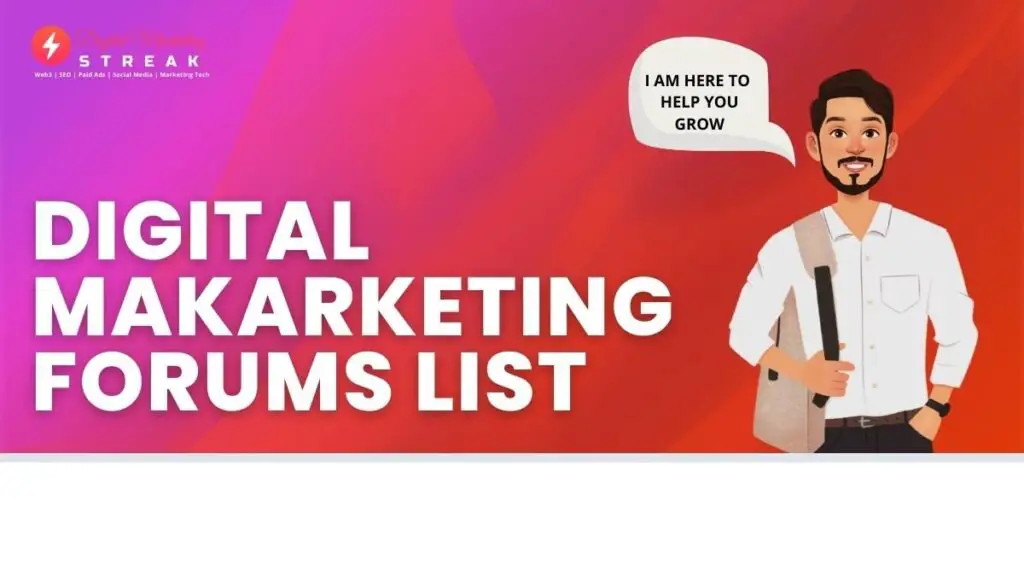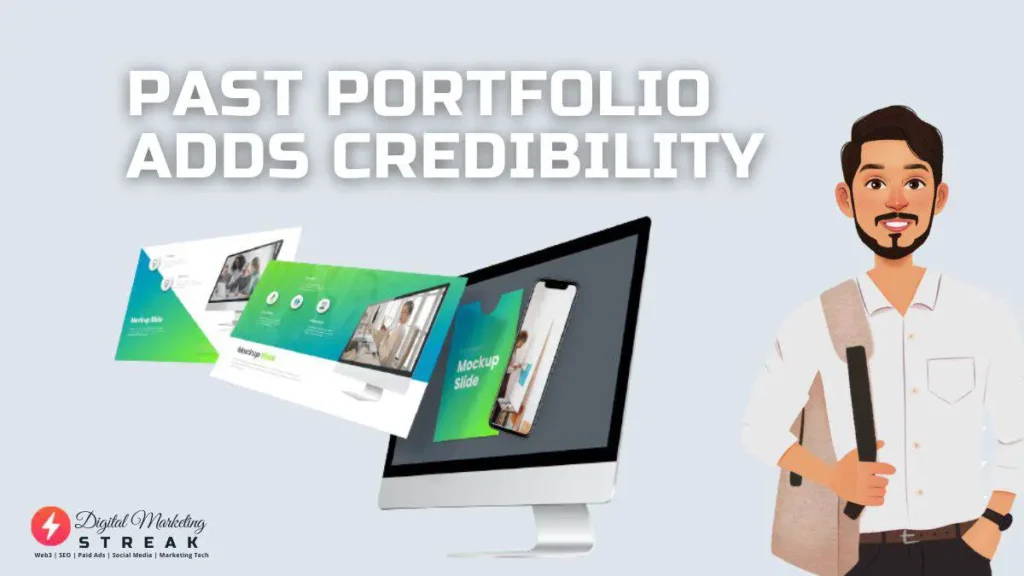You’d probably go to school if you want to be a lawyer, doctor, or architect. Most employers would prefer to hire someone with a high school degree than someone without one. But when we talk about digital marketing, you don’t need to spend millions on a college degree (especially if you don’t want to) to learn how to do it right.
It can take anywhere between 2-3 months to learn digital marketing tools and techniques and it can take another 6 to 8 months to practice them. This also depends alot of other factors like hours being alocated on learning per week, enviroment, practice case studies etc.
We have done our research and thought to share our tried and true ways with you so you can achieve your goals with fewer bottlenecks.

In this blog, we will cover the types of digital marketing, steps & tips to become a marketer, and top qualities that you should develop as a modern-day marketer through the end of the blog.

Let’s dive in.
Table of Contents
- Digital Marketing And Types
- How Long Does It Take To Learn Digital Marketing? Step by Step Guide
- 7 Steps to Begin with Digital Marketing
- Recommended Digital Marketing Certificate Courses:
- How Long Does It Take To Learn Digital Marketing? Qualities a Digital Marketer Should Have
- Takeaway
Digital Marketing And Types
There multiple options from where you want to start your joirney as a digital marketer.
Digital marketing means the use of digital mediums in order to promote a product, service or brand targetting the right set of audience, on right platform in scarse budgets.
Being a digital marketer, You have to evaluate your clients target audience to see what platforms they are using to target them with the right strategy. To do that here are few types of digital maketing that you can choose:
Types of Digital Marketing:
- Search Engine Optimization (SEO)
- Pay-per-click Advertising (PPC)
- Social Media Marketing
- Content Marketing
- Email Marketing
- Affiliate Marketing
- Influencer Marketing
- Video Marketing
- Mobile Marketing
- Display Advertising
As a digital marketer, you can pick any of these fields to spend and specialize in it or become a master of all trades and learn everything. But to begin, you need a roadmap to follow through.
Here is a table on digital marketing skills types that provides information on average time to learn each skill, Difficulty level, Average Payscale and mediums:
| Digital Marketing Skill | Average Time to Learn | Difficulty Level (Score out of 10) | Average Pay in US | Mediums |
|---|---|---|---|---|
| Search Engine Optimization (SEO) | 6-12 months | 6/10 | $50,000 – $100,000+ | Online courses, blogs, books, conferences |
| Pay-per-click Advertising (PPC) | 3-6 months | 7/10 | $50,000 – $90,000+ | Online courses, Google Ads certification, conferences |
| Social Media Marketing | 3-6 months | 5/10 | $40,000 – $70,000+ | Online courses, blogs, podcasts, conferences |
| Content Marketing | 3-6 months | 6/10 | $45,000 – $90,000+ | Online courses, blogs, books, podcasts |
| Email Marketing | 2-4 months | 4/10 | $40,000 – $70,000+ | Online courses, blogs, podcasts, conferences |
| Affiliate Marketing | 2-4 months | 4/10 | $40,000 – $70,000+ | Online courses, blogs, podcasts, conferences |
| Influencer Marketing | 3-6 months | 6/10 | $40,000 – $80,000+ | Online courses, blogs, podcasts, conferences |
| Video Marketing | 3-6 months | 7/10 | $50,000 – $90,000+ | Online courses, YouTube, conferences |
| Mobile Marketing | 2-4 months | 5/10 | $50,000 – $90,000+ | Online courses, blogs, podcasts, conferences |
| Display Advertising | 2-4 months | 6/10 | $45,000 – $80,000+ | Online courses, blogs, Google Ads certification, conferences |
Let’s look at the step by step guide that will help you answer the question.
How Long Does It Take To Learn Digital Marketing? Step by Step Guide
You can learn digital marketing in as little as 12 weeks. However, mastering the skillset will require you job training and experience over time. To become a Digital Marketing Specialist it can take anywhere around 12 to 24 months.
To become a digital marketer in today’s time, you need to understand that there’s nothing as ‘god-gifted’ when it comes to marketing skills. You can work on yourself and tweak into the marketing field. So, hold tight as we slide through the characteristics and how you should perform to stand out from other marketers.
7 Steps to Begin with Digital Marketing
1. Begin with Search Engine Optimization
Most PPC, content marketing, and social media marketing approaches are founded on SEO fundamentals. So developing your SEO expert should be your starting point. Learning the latter is easy.
| Stage | Description | Resources to Learn | Key Terms to Know | Time to Cover |
|---|---|---|---|---|
| Stage 1: Introduction to SEO | Learn what SEO is, why it matters, and how search engines work. | Moz’s Beginner’s Guide to SEO, Yoast’s SEO for Beginners Guide, Google’s SEO Starter Guide | Crawling, indexing, ranking, SERP, keywords | 1-2 weeks |
| Stage 2: Keyword Research | Learn how to find the right keywords to target for your website or client. | Moz’s Keyword Research Guide, Google Ads Keyword Planner, Ahrefs’ Keyword Explorer | Long-tail keywords, search volume, keyword difficulty, intent | 1-2 weeks |
| Stage 3: On-Page Optimization | Learn how to optimize website pages and content for search engines and users. | Moz’s On-Page Optimization Guide, Yoast’s On-Page SEO Checklist, Google’s Search Quality Evaluator Guidelines | Title tags, meta descriptions, header tags, internal linking, schema markup | 2-3 weeks |
| Stage 4: Technical SEO | Learn how to improve website performance and user experience through technical optimizations. | Moz’s Technical SEO Guide, Google’s PageSpeed Insights, Ahrefs’ Site Audit Tool | Website architecture, crawlability, mobile responsiveness, structured data, site speed | 2-3 weeks |
| Stage 5: Off-Page Optimization | Learn how to build authority and trust for your website through off-page optimization. | Moz’s Link Building Guide, Ahrefs’ Backlink Checker, SEMrush’s Brand Monitoring Tool | Backlinks, anchor text, domain authority, social signals | 2-3 weeks |
| Stage 6: Analytics & Measurement | Learn how to track and measure SEO performance using tools like Google Analytics and Google Search Console. | Google Analytics Academy, Google Search Console Help Center | Impressions, clicks, click-through rate (CTR), bounce rate, conversions | 1-2 weeks |
| Stage 7: Ongoing SEO & Algorithm Updates | Learn how to stay up-to-date on the latest SEO trends, algorithm updates, and best practices. | Moz’s Blog, Search Engine Journal, Search Engine Land | Algorithm updates, best practices, industry news | Ongoing |
Note: The above time estimates are based on a general guideline and may vary depending on the individual’s pace and prior knowledge.
2. Practice Process & Tools
Online marketing is not really a scientific model but rather a practical one. Once you’ve grasped the principle behind a plan, try putting it into action. Keep an eye on the outcomes, optimize them, and gain from your failures.
| Stage | Description | Tools Required | Process | Time Period | Outcomes |
|---|---|---|---|---|---|
| Stage 1: Keyword Research | Identify relevant keywords and phrases to target in your blog posts. | Google Keyword Planner, Ahrefs, SEMrush | Conduct keyword research to identify high-volume, low-competition keywords related to your blog’s topic. | 1-2 weeks | A list of targeted keywords to use in your blog content. |
| Stage 2: On-Page Optimization | Optimize your blog posts to improve their visibility in search engine results pages (SERPs). | Yoast SEO plugin, Google Search Console | Use Yoast SEO plugin to optimize your blog posts’ title tags, meta descriptions, URL slugs, headers, and content for your target keywords. Verify your site with Google Search Console to monitor your blog’s performance in search results. | 1-2 weeks per blog post | Improved visibility in search engine results pages (SERPs). |
| Stage 3: Link Building | Build high-quality backlinks to your blog to improve its domain authority and search engine rankings. | Ahrefs, Moz Link Explorer, BuzzSumo | Use link analysis tools to identify opportunities to build backlinks to your blog, such as guest posting on other blogs, creating shareable infographics, and promoting your content on social media. | Ongoing | Increased domain authority and search engine rankings. |
| Stage 4: Analytics & Measurement | Track your blog’s performance and identify areas for improvement. | Google Analytics, Google Search Console | Use Google Analytics to monitor your blog’s traffic, engagement, and conversions. Use Google Search Console to track your blog’s visibility in search engine results pages (SERPs) and identify technical issues that could be impacting your blog’s performance. | Ongoing | Improved understanding of your blog’s performance and opportunities for improvement. |
Note: The time period for each stage may vary depending on the individual’s pace and the complexity of their blog. It’s recommended to prioritize each stage based on the current state of your blog and its goals.
3. Gain Certifications
Try to obtain certification as you proceed through your education. It’s an excellent approach to demonstrate your knowledge. Udemy, Coursera References to virtual classrooms that provide credentials can.
4. Collaborate With Marketing Professionals
You can’t learn so much through Google as what a professional digital marketer can teach you. Ideally, the answer to how long does it take to learn digital marketing? Also depends on the quality of homework you are doing.
It would help if you worked under the direction of professional digital marketers. They can help you transfer from concept to implementation and teach you a few secrets and methods that you won’t find in any manuals or workshops.
You can interact with fellow digital marketers on digital marketing forums, Access our List of Digital Marketing Forums here!

5. Create A Blog
Starting your marketing blogging channel will allow you to practice what you’ve learned and demonstrated your competence. When you sit down and write about online marketing, you may also examine how you comprehend a matter.
6. Always be a Learner
Digital marketing is a constantly changing field, and there are always newer things coming up, so if you choose to become a digital marketer, learning should never stop. As a digital marketing practitioner, it is your responsibility to stay up to date on the current trends and maintain your customers engaged.
7. Build Your Portfolio
It’s best to create your portfolio when you’ve completed the essential education and training. Even though this isn’t mandatory, having one on hand will undoubtedly improve your proficiency. Not to add, it will increase your chances of striking out during recruitment.

A portfolio should include work you’ve done for clientele as a digital marketer. These could have been completed as part of internship or externship programs. Note that you need to ask a client’s permission before uploading the work you’ve done in collaboration in your portfolio.
I recommend creating a great LinkedIn profile and optimize linkedIn portfolio as much as possible to gain maximum exposure from clients and recruiters.
Recommended Digital Marketing Certificate Courses:
| Course | Qualification | Duration | Cost | Link |
| Hubspot Digital Marketing Free Course | SEO Non-paid ads strategies Lead generation | 4:04 hours | Free | https://academy.hubspot.com/courses/digital-marketing?library=true& |
| Google Digital Marketing Garage | All-rounder marketing SEO SEMAd analytics | 40 hours | Free | https://learndigital.withgoogle.com/digitalgarage/course/digital-marketing |
| Google Search Ads | All about ads+ optimization Target searches | 3.7 hours | $50/exam | https://skillshop.exceedlms.com/student/path/18128-google-ads-search-certification |
| Facebook Marketing Hubspot | Facebook marketing Reach Strategy building | 1.21 hours | Free | https://academy.hubspot.com/courses/facebook-marketing-training?library=true&library=true&= |
| Social Media Marketing Hubspot | Social media marketing strategies Inbound marketing | 4.8 hours | Free | https://academy.hubspot.com/courses/social-media |
How Long Does It Take To Learn Digital Marketing? Qualities a Digital Marketer Should Have
Digital marketing is not a child’s play. But with the right approach and efforts, you can excel at it.
- Be flexible, stay updated, and become adaptable as markets are always changing.
- Use data analysis and perfect its integration.
- Know everything in the field, master what you resonate with.
- Creativity will be your drive.
- Attention to detail will help improve your current stand.
- Fill in the technical and business gap. Use keywords as a tool.
- Rely on reports to monitor data and evaluate effectiveness or ROI.
- Personalize every experience, so your projects are different from others.
- Having a blog will increase your authority in the field. It will also work as your portfolio.
- Understand your demographic and direct your campaigns accordingly.
Takeaway
As we conclude, let’s have a recap: how long does it take to learn digital marketing? As long as you learn the basics and practice it.
We wish you good luck and present our forum at your service. Write to us if you need any help in your journey of becoming a digital marketer.

